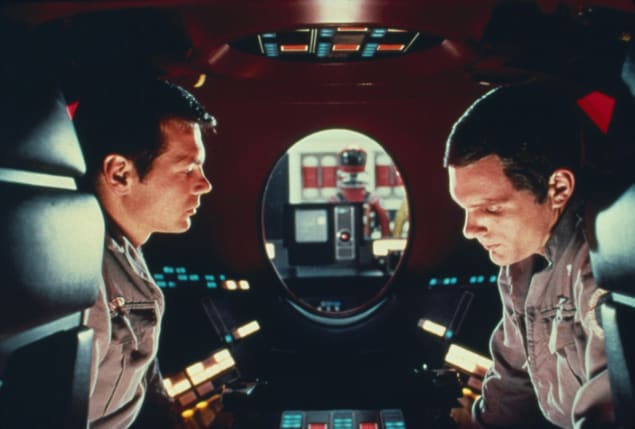
Four years have passed since Physics World proclaimed “Science cleans up at the Oscars” — and things have only got better since then. Last year, The Shape of Water became the first sci-fi film to win Best Picture; this year, Black Panther might make it back-to-back wins for the genre (although Roma — a drama by Alfonso Cuarón, who won Best Director for Gravity in 2014 — is the bookmakers’ favourite).
The Shape of Water and Black Panther are both wonderful science-themed films. In particular, the Black Panther character Princess Shuri has been hailed as a role model for encouraging girls to study STEM subjects. But what are the best films about science or scientists? It’s a question you might like to discuss as you watch this year’s Oscars ceremony, which begins on Sunday 24 February at 5 p.m. Los Angeles time.
To help get your discussion under way, below is my suggestion for the top five films about science or scientists – in no particular order. They span 51 years and include two Stanley Kubricks, one Ridley Scott, one Steven Spielberg, and one film by the not-so-famous Shane Carruth.
None of these films were big Oscar winners: they only have four wins between them, and none of those were in the “big five” categories of Best Picture, Best Director, Best Actor, Best Actress or Best Screenplay. But all of them capture a special something about science or scientists.
Dr. Strangelove or: How I Learned to Stop Worrying and Love the Bomb
1964 | Director: Stanley Kubrick
Dr. Strangelove is best known as a black comedy, with the actor and comedian Peter Sellers playing three of the lead roles. (Sellers was paid one million dollars for the film, leading Stanley Kubrick to remark: “I got three for the price of six.”) It is also a brilliant pre-echo of the kinds of issues discussed by Physics World‘s Anna Demming in her recent review of Hello World: How to be Human in the Age of the Machine: “when it comes to the stars of the numerous hapless human–machine encounters recounted throughout the book, their ill-advised approach was far from obvious”.
Fun Oscars fact Dr. Strangelove was the first sci-fi film to be nominated for Best Picture. It lost to My Fair Lady.
2001: A Space Odyssey
1968 | Director: Stanley Kubrick
Let’s be honest: the day-to-day work that leads to scientific discovery can sometimes be mind-numbingly boring. In the original 161-minute version of 2001, Kubrick tried to capture this monotony with a lengthy scene where astronaut Dave Bowman simply jogs around and around (and around) the interior of the Discovery One spacecraft. It worked a bit too well: at the film’s premiere, the audience began booing, hissing, and saying “Let’s move it along” and “Next scene”. Following that disastrous premiere — 241 people walked out the theatre, including executives from the production company MGM — Kubrick cut 19 minutes from the film.
Fun Oscars fact Kubrick was beaten to Best Director for 2001 by Carol Reed, who directed the musical Oliver! (“I think I better think it out again,” as Fagin might have said about one of the biggest snubs in Oscars history.)
Jurassic Park
1993 | Director: Steven Spielberg
Steven Spielberg’s third sci-fi blockbuster – after Close Encounters of the Third Kind (1977) and E.T. the Extra-Terrestrial (1982) – is the film most cited by scientists and science journalists when explaining new findings to the public. Between 1998 and 2017, Jurassic Park was referenced 21 times in Nature News, from “Jurassic Park got it right” in an article about how theropod dinosaurs such as velociraptors used their tails, to “Say goodbye to Jurassic Park” in a discussion about the difficulty of restoring species that have been extinct for more than a few thousand years. You’ll even find the film’s best quote being used to start an article in Physics World.
Fun Oscars fact Of the films in this top five list, Jurassic Park is the only one to have had a good night at the Oscars — it won all three categories in which it was nominated (Best Sound Editing, Best Sound Mixing and Best Visual Effects). The only other Oscar winner in this list is 2001 (Best Visual Effects).
Primer
2004 | Director: Shane Carruth
As Niels Bohr once said: “How wonderful that we have met with a paradox. Now we have some hope of making progress.” He would have enjoyed Primer, a cult independent film in which two scientists — along with us, the audience — are brutally confronted with the paradoxes of time travel. It is the ultimate “hard” sci-fi film. Where 2001 was fairly light on exposition, Primer is an exposition-free zone. For 2001, Arthur C Clarke’s novel helpfully filled in the gaps; for Primer, there are (mercifully) a number of fan websites that do a fabulous job of explaining how it all works.
Fun Oscars fact Primer is definitely not the kind of film that gets nominated for Oscars. However, it did win the Grand Jury Prize at the Sundance Film Festival, which is a prestigious event for independent film-makers.
The Martian
2015 | Director: Ridley Scott
If this was a list of the top five sci-fi films, Ridley Scott would probably have two entries: Alien (1979) and Blade Runner (1982). But this is a list of the top 5 films about science or scientists — and there is no film better than The Martian at showing us a scientist using science (and, on occasion, duct tape) to solve problems. In the words of astronaut Mark Watney: “In the face of overwhelming odds, I’m left with only one option. I’m gonna have to science the shit out of this.”
Fun Oscars fact The Martian, which was nominated for seven Oscars in 2016, and Interstellar, which received five nominations the year before (it won Best Visual Effects), both feature Matt Damon marooned on an alien planet.



